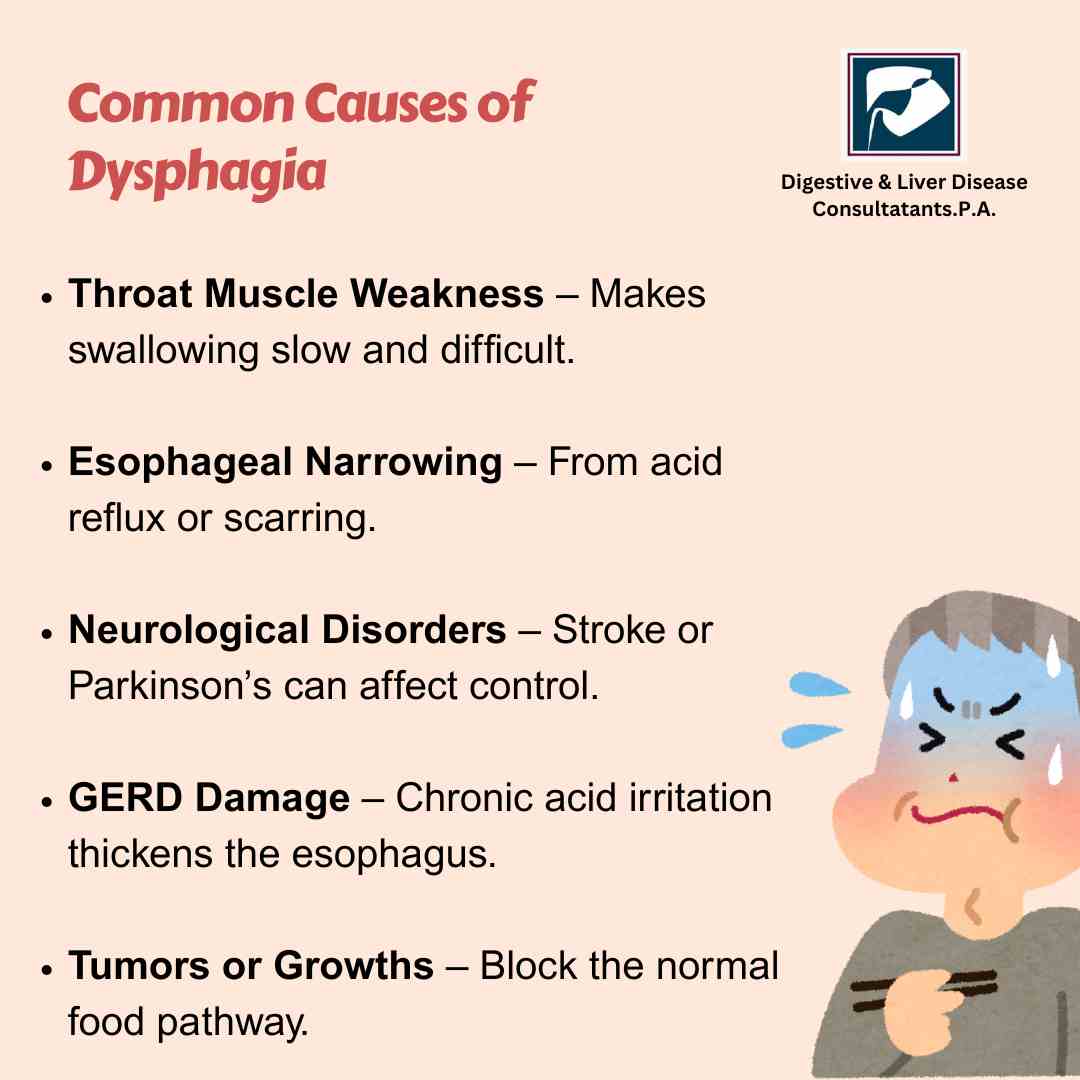Have you ever felt like food gets stuck in your throat or that swallowing takes more effort than usual? That uncomfortable or even painful feeling might be a sign of dysphagia, a medical term for difficulty swallowing. While it’s common to occasionally have trouble swallowing when eating too fast or not chewing well, frequent or worsening symptoms should never be ignored. Let’s break down what causes dysphagia, how to recognize it, and what you can do about it.
What Is Dysphagia?
Dysphagia is not a disease itself but a symptom of an underlying condition affecting the swallowing process. Normally, swallowing involves a series of coordinated actions between the mouth, throat, and esophagus. When something disrupts that coordination, swallowing can become slow, painful, or incomplete.
Signs and Symptoms
People with dysphagia may notice:
- Pain while swallowing
- Feeling that food or liquid is stuck in the throat or chest
- Coughing or choking while eating or drinking
- Drooling or inability to swallow saliva
- Hoarseness or throat clearing after swallowing
- Regurgitation of food
- Unexpected weight loss or dehydration
If these symptoms persist or worsen, it’s important to talk to a gastroenterologist to find the root cause.

Common Causes of Swallowing Problems
1. Acid Reflux and GERD
Chronic acid reflux, also called gastroesophageal reflux disease (GERD), is one of the most common causes of swallowing difficulties. Over time, stomach acid can damage the lining of the esophagus, leading to inflammation, narrowing (strictures), and difficulty swallowing solid foods.
2. Esophageal Strictures
When scar tissue forms due to acid reflux, surgery, or certain infections, the esophagus can narrow. This makes it hard for food to pass through smoothly, often causing a feeling of food sticking mid-way.
3. Esophageal Rings or Webs
Some people develop thin layers of tissue inside the esophagus that can partially block food passage. These structural changes can lead to intermittent swallowing problems, especially with solid foods.
4. Neurological Disorders
Conditions like stroke, Parkinson’s disease, multiple sclerosis, or ALS can affect the nerves and muscles responsible for swallowing. This type of dysphagia often occurs because the brain’s signals to the swallowing muscles are disrupted.
5. Muscle Disorders
Certain diseases, like myasthenia gravis or scleroderma, affect the strength and coordination of swallowing muscles. This makes it difficult to move food from the mouth through the esophagus efficiently.
6. Esophageal Cancer or Tumors
A tumor in the esophagus can narrow the passageway, leading to progressive difficulty swallowing solids and eventually liquids. While this is less common, it’s a serious cause that requires immediate medical attention.
7. Infections or Inflammation
Infections caused by bacteria, fungi, or viruses can inflame the esophagus. This is more common in people with weakened immune systems and can cause pain and swelling that interfere with swallowing.
8. Aging-Related Changes
As people age, muscle tone in the esophagus can weaken, and coordination may decline. Older adults often notice mild swallowing difficulties that worsen when combined with other health conditions.
How Dysphagia Is Diagnosed
If you’re having persistent swallowing issues, your doctor may recommend:
Endoscopy: A thin tube with a camera is used to look inside your esophagus and identify any blockages, inflammation, or structural problems.
Barium Swallow Test: You drink a liquid containing barium, and X-rays are taken to observe how food and liquid move through your throat and esophagus.
Esophageal Manometry: This test measures the muscle strength and coordination in your esophagus during swallowing.
Treatment Options for Dysphagia
Treatment depends on the underlying cause. Here’s how doctors often manage it:
For Acid Reflux or GERD: Medications like proton pump inhibitors (PPIs) or lifestyle changes such as eating smaller meals, avoiding spicy foods, and not lying down after eating can help reduce acid damage.
For Esophageal Strictures: A gastroenterologist may perform an endoscopic procedure called dilation, where a special balloon or instrument widens the narrowed part of the esophagus.
For Neurological Causes: Speech and swallowing therapy can help improve coordination and teach safe swallowing techniques.
For Muscle or Motility Disorders: Certain medications and dietary modifications can improve swallowing function and reduce discomfort.
For Tumors or Cancer: Treatment may involve surgery, radiation, or chemotherapy, depending on the stage and location.
Simple Tips to Make Swallowing Easier
- Eat slowly and chew food thoroughly.
- Take small bites and sips.
- Sit upright during meals and stay upright for at least 30 minutes afterward.
- Avoid talking while eating to reduce the risk of choking.
Choose soft foods like soups, smoothies, and mashed vegetables when swallowing feels difficult.
When to See a Gastroenterologist
If you often choke, cough, or feel pain when swallowing, don’t wait for it to pass. These could be signs of a treatable condition or something more serious. Early diagnosis can prevent complications such as malnutrition, aspiration pneumonia, or severe esophageal narrowing.
Care and Expertise at Digestive & Liver Disease Consultants, P.A.
At Digestive & Liver Disease Consultants, P.A., our team of board-certified gastroenterologists specializes in diagnosing and treating swallowing disorders. Using advanced diagnostic tools like endoscopy and esophageal manometry, we identify the exact cause of dysphagia and create personalized treatment plans to help you eat and live comfortably again.
If You’re Struggling to Swallow
If you suffer from persistent swallowing problems, schedule a consultation with the experts at Digestive & Liver Disease Consultants, P.A. Our specialists provide comprehensive care for conditions like GERD, esophageal strictures, and other digestive issues.
Conclusion
Swallowing problems may seem minor at first, but they can quickly affect your nutrition and quality of life. The good news is that most causes of dysphagia can be treated effectively once diagnosed. Don’t ignore the signs—getting evaluated early can make all the difference in restoring comfortable eating and protecting your digestive health.
Need expert help with swallowing issues? Contact Digestive & Liver Disease Consultants, P.A. today to get the right diagnosis and treatment for your condition.






